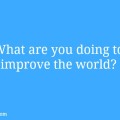What can I do about the struggle of poverty in the world? I am just one person, and the need is so rampant everywhere.
A quick Google search reveals that nearly half of the world’s population — more than 3 billion people — lives on less than $2.50 a day. More than 1.3 billion live in extreme poverty or less than $1.25 a day. One billion children worldwide are living in poverty. According to UNICEF, 22,000 children die each day due to poverty. But that’s all a little surreal. How does one really internalize a billion people? We might ask what’s happening right here at home.
 The official poverty rate in the US is 12.7 percent, based on the U.S. Census Bureau’s estimates. That year, an estimated 43.1 million Americans lived in poverty according to the official measure.
The official poverty rate in the US is 12.7 percent, based on the U.S. Census Bureau’s estimates. That year, an estimated 43.1 million Americans lived in poverty according to the official measure.
In the state of Utah, we have one of the nation’s lowest poverty rates; even still, our poverty level hovers at 10.2 percent, seventh lowest among the states. The national average is 14 percent.
I am just one person. What can I really do about all of this, anyway?
Edward Everett Hale said:
“I am only one, but I am one. I cannot do everything, but I can do something. And because I cannot do everything, I will not refuse to do the something that I can do.”
I am one person, and I can’t do it all, but I can do something. And that’s where it all begins.
Even a million dreams starts with one.
We can be that one.
My wife and I had a visit from our grandsons recently. We love being with them, and I really appreciate the good influence of my children. Of course, we had a great time. I am constantly amazed how fantastic this new generation is.
Gratefully, we have a host of friends and family that are eager to pitch in and help us. I am not a spring chicken anymore. The never-ending energy of my grandchildren frequently outlasts mine, and I see so much good in them. It is not always easy to know how to best influence the young for good.
Maybe we can only lend a concerned ear and a compassionate heart. Much of the world’s struggle today is found in loneliness, and this malady afflicts both the giver and the receiver: the giver because too often those playing that role are doing it alone, and the receiver because the lonely are often invisible to the multitude. God loveth a cheerful giver.
The beggar on the street and the principal attorney in the boardroom both have needs, and though they may differ considerably from one another, each is important and significant.
When Jesus Christ was on the earth, he did much to alleviate people’s hardships and pain. He blessed those with whom He associated and lifted the downtrodden. Volumes have been written to acknowledge and learn from His example. But even then, He did not eradicate hunger, pain, and other needs from all his followers. He healed many. He did not heal everyone.
He allowed his followers the opportunity to experience the challenges of life. He himself suffered them all. The purpose of life, among other things, is to engage in the struggle. We often see hardships as bad or unsavory. This is not necessarily the case; instead, that is the very reason why we came to this planet to experience life. With the good comes the undesirable. We can learn and benefit from both the good and the bad.
So about now you may be thinking “How can he say that? How can one believe that the tragedy or hardships of life have value or can even be considered worthwhile?” True. At first it appears contradictory and illogical, but let’s look at another example with which we are all familiar.
I saw my first chick hatch long before my family moved to the farm or raised chickens in our backyard. In fact, I was just a little boy at the time. My big brother announced he was going to hatch some chicken eggs. The eggs were kept under a warming light. And it sounded interesting and fun…at first.
Let me explain. The whole contraption was pretty elaborate—glass, lights, temperature gauge, eggs, and straw. He had the proper equipment, and frankly, I didn’t think much about it. I guess I was used to immediate gratification, because as the days turned into weeks with no visible sign of progress, my interest and attention began to wane, and soon the waiting became unbearable.
Hatching took weeks to occur, and I lost interest long before there was any noticeable movement. The contraption had sat motionless now for three weeks. Then, in an instant, everything changed. Though I was engaged in the typical fanfare of childhood and had showed little interest, this contraption soon became the singular focus of all of us children.
As it happened, one night, the eggs began vibrating a little. Suddenly, small cracks appeared in the shells and then a hole. Some progressed more rapidly than others, but for a young boy, it was dreadfully slow. After what seemed to be a long time, a beak finally appeared, and then a head, a wing, and a leg. Some extracted themselves from their egg and began walking around and investigating their little world. Others struggled to free themselves from the egg shell.
Immediately, my attention was turned to those still struggling in their eggs. I wanted to reach down and help break the little shells apart to assist these oppressed little creatures, but my brother said no. He said that if I helped them, they would not live. He explained that the strength they developed through the struggle was what gave them the ability to survive outside their shells.

To read more articles by Walter Penning, click here.
This event and many other experiences in my life have shown me the value in the struggle. Weightlifters increase the burden and number of repetitions to build their muscles. Track and field stars employ lengthy and difficult exercises to achieve strength, endurance, and speed. And even those recovering from operations or accidents exercise their limbs, muscles, and minds to overcome their hardship and become strong again. Tragedies become tragic when we overlook or refuse to acknowledge the good that can come from them.
And when we have learned to overcome our challenges and grow from hardship, we will become a resource and blessing to others who are trying to follow our lead.
And thankfully, we have many examples as well to help us climb our very own mountains.
It all starts with a dream and hope in the Savior Jesus Christ. He stands ready to make our struggles manageable and consecrate all our afflictions for our gain, when at first they seem overwhelming.
I am only one, but with the help of Jesus Christ, I can make all the difference in myself and others.
“Each day, ours is the challenge to access the power of the Atonement so that we can truly change, become more Christlike, and qualify for the gift of exaltation and live eternally with God, Jesus Christ, and our families.” – President Russell M Nelson, “Thanks Be to God,” April 2012
Yes, there is strength in the struggle.
About Walter Penning
In 1989, Walter Penning formed a consultancy based in Salt Lake City and empowered his clients by streamlining processes and building a loyal, lifetime customer base with great customer service. His true passion is found in his family. He says the best decision he ever made was to marry his sweetheart and have children. The wonderful family she has given him and her constant love, support, and patience amid life's challenges is his panacea.
Twitter •






